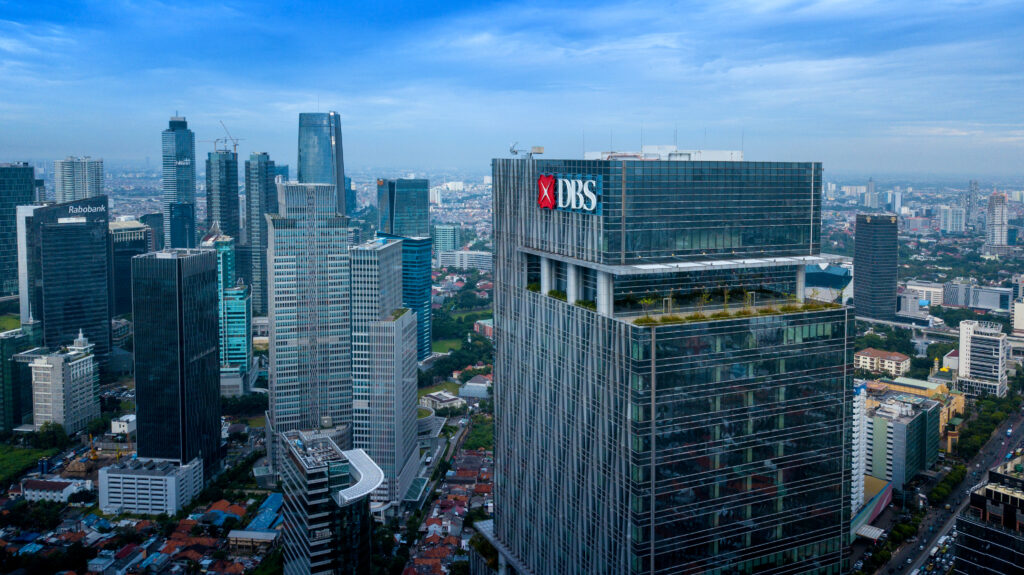As of 3 November 2025, the stock is trading at S$53.79, a stone’s throw away from its 52-week high of S$54.80.
At this level, investors are faced with a stark choice: should they take profits or stay invested.
Why DBS Is at Record Levels
In 2025’s second quarter (2Q2025), DBS reported a net profit of S$2.82 billion, a YoY increase of 1%.
The figure was approximately 18% less than the all-time high of S$3.44 billion achieved in Q1, due to decreased interest margins and increased tax costs from the new global minimum tax.
The bank’s total income increased by 5% YoY to S$5.73 billion, with net interest income (NII) rising 2% from strong deposit growth and proactive balance-sheet hedging.
Despite a 4% annual decline in NII for the commercial book to S$3.625 billion due to lower rates, DBS’s net fee income and treasury sales reached their second-highest levels ever, bolstered by enhanced wealth-management and trading activities.
The Case for Taking Profits
Some investors may prefer to lock in profits following DBS’s strong rally.
Interest rate cuts are expected to continue following last week’s reduction, potentially narrowing DBS’s NIM — in other words, it could earn less for each loan.
For its part, the local bank’s management expects margins to “moderate slightly” when deposit repricing catches up.
Meanwhile, the stock’s valuation has now reached the upper end of its historical range.
DBS trades at around 2.2 times book value, compared to a 10-year average of around 1.4 times.
At present levels, the dividend yield is 5.6%, based on a full-year payout of S$3 per share, which includes the S$0.15 per share quarterly capital return dividend declared earlier this year.
The Case for Staying Invested
Long-term investors may find reasons to hold.
DBS has demonstrated that it can maintain earnings even in a low-rate environment.
The bank’s wealth management and fee income revenue is outpacing loan-related income, lowering reliance on interest margins.
Wealth management fees rose to S$1.37 billion in 1H2025, up from S$1.05 billion the previous year, a surge of 30.3%.
Total fee revenue increased to S$2.90 billion from S$2.54 billion, a rise of 14.3% compared to the previous year.
Besides this, the bank also has an impressive record with respect to dividend payments to its shareholders.
The annual dividends have been progressively increasing from S$1.20 per share in 2020 to S$3.00 in 2025.
The bank’s management also plans to grow their ordinary dividend by S$0.24 per year, provided they achieve an ROE of between 15% and 17%.
Loan growth came in at 4% YoY, in constant currency, for 1H 2025, supported by broad-based expansion across Singapore, Hong Kong and India.
DBS’ diversified portfolio across consumer, institutional and treasury segments continues to cushion it against rate-cycle volatility.
What This Means for Investors
Shareholders must now weigh the option of locking in their gains or continuing with DBS’s success story.
But in portfolios with shorter investment terms or high banking sector concentration, taking profits could be useful in portfolio re-balancing and risk reduction.
Moreover, the current stock price of DBS already incorporates much of the ‘buzz’ surrounding their record results and dividend increases.
However, long-term investors may choose to remain invested.
DBS has proved the ability to provide sustained earnings across multiple rate cycles, supported by solid capital reserves and a disciplined approach to shareholder returns.
Even as interest margins narrow, its expanding wealth management and regional operations open up new revenue streams.
For income-focused investors, the stock’s dividend yield of over 5% remains appealing and is supported by strong cash flows.
Since the goal of management is to promote progressive dividend growth, DBS offers both stability and the possibility of compounding.
So, whether one sells and harvests the gains or stays invested in the index funds, ultimately it’s up to the individual’s investment plan.
Those with short-term investment plans might just choose to capitalise on their gains in terms of dividends.
Get Smart: Patience Still Pays
Reaching an all-time high does not imply that a stock is overpriced.
DBS’s balance-sheet soundness, consistent dividends, and durable profitability make it an important choice for long-term portfolios.
Before making a decision, the most astute investors assess the risk of near-term margin compression against the power of long-term compounding.
Imagine a life where steady income flows, no matter the market. Our new free report, “Retire Early with Dividends,” reveals how. We’ve pinpointed 5 dependable Singapore dividend stocks that offer a proven, stress-free path to financial freedom. Stop just dreaming and start building your early retirement plan today. Your free guide awaits here.
Follow us on Facebook, Instagram and Telegram for the latest investing news and analyses!
Disclosure: Joseph does not own any of the shares mentioned.





